Food for thoughts
Thesaurus : Doctrine

Référence complète : Bossuet, sermon De l’éminente dignité des pauvres, 1659.
Édité par Alain Supiot, 64 p. , Éditions Mille et un nuits, 2015.
Compliance and Regulation Law bilingual Dictionnary

The Independent Administrative Authority (IAA) is the legal form that the legislator has most often chosen to build regulatory authorities. The IAA is only its legal form, but French law has attached great importance to it, following the often formalistic tradition of public law. They are thus independent administrative authorities, especially in the legal systems of continental law like France, Germany or Italy.
The essential element is in the last adjective: the "independent" character of the organism. This means that this organ, which is only administrative so has a vocation to be placed in the executive hierarchy, does not obey the Government. In this, regulators have often been presented as free electrons, which posed the problem of their legitimacy, since they could no longer draw upstream in the legitimacy of the Government. This independence also poses the difficulty of their responsibility, the responsibility of the State for their actions, and the accountability of their use of their powers. Moreover, the independence of regulators is sometimes questioned if it is the government that retains the power to appoint the leaders of the regulatory authority. Finally, the budgetary autonomy of the regulator is crucial to ensure its independence, although the authorities having the privilege of benefiting from a budget - which is not included in the LOLF - are very few in number. They are no longer referred to as "independent administrative authorities" but as "Independent Public Authorities", the legislator making a distinction between the two (French Law of 20 January 2017).
The second point concerns the second adjective: that it is an "administrative" body. This corresponds to the traditional idea that regulation is the mechanism by which the State intervenes in the economy, in the image of a kind of deconcentration of ministries, in the Scandinavian model of the agency. If we allow ourselves to be enclosed in this vocabulary, we conclude that this administrative body makes an administrative decision which is the subject of an appeal before a judge. Thus, in the first place, this would be a first instance appeal and not a judgment since the administrative authority is not a court. Secondly, the natural judge of the appeal should be the administrative judge since it is an administrative decision issued by an administrative authority. But in France the Ordinance of 1 December 1986 sur la concurrence et la libéralisation des prix (on competition and price liberalization), because it intended precisely to break the idea of an administered economy in order to impose price freedom on the idea of economic liberalism, required that attacks against the decisions of economic regulators taking the form of IAA are brought before the Court of Appeal of Paris, judicial jurisdiction. Some great authors were even able to conclude that the Paris Court of Appeal had become an administrative court. But today the procedural system has become extremely complex, because according to the IAA and according to the different kinds of decisions adopted, they are subject to an appeal either to the Court of Appeal of Paris or to the Conseil d'État (Council of State) . If one observes the successive laws that modify the system, one finds that after this great position of principle of 1986, the administrative judge gradually takes again its place in the system, in particular in the financial regulation. Is it logical to conclude that we are returning to a spirit of regulation defined as an administrative police and an economy administered by the State?
Finally, the third term is the name itself: "authority". It means in the first place an entity whose power holds before in its "authority". But it marks that it is not a jurisdiction, that it takes unilateral decisions. It was without counting the European Court of Human Rights (ECHR) and the judicial judge! Indeed, Article 6§1 of the European Convention on Human Rights states that everyone has the right to an impartial tribunal in civil and criminal matters. The notion of "criminal matter" does not coincide with the formal traditional concept of criminal law but refers to the broad and concrete factual concept of repression. Thus, by a reasoning which goes backwards, an organization, whatever the qualification that a State has formally conferred on it, which has an activity of repression, acts "in criminal matters". From this alone, in the European sense, it is a "tribunal". This automatically triggers a series of fundamental procedural guarantees for the benefit of the person who is likely to be the subject of a decision on his part. In France, a series of jurisprudence, both of the Cour de cassation (Court of Cassation), the Conseil d'État (Council of State) or the Conseil constitutionnel (Constitutional Council) has confirmed this juridictionnalization of the AAI.
Thesaurus : Doctrine

Complete reference : Archives de Philosophie du Droit (APD), Le droit international, tome 32, ed. Sirey, 1987, 442 p.
Read the summaries of the articles in English.
See the presentation of other volumes of Archives de Philosophie du Droit.
Thesaurus : Doctrine
Référence : Beauvais, P., Méthode transactionnelle et justice pénale, in Gaudemet, A. (dir.), La compliance : un nouveau monde? Aspects d'une mutation du droit, coll. "Colloques", éd. Panthéon-Assas, Panthéon-Assas, 2016, pp. 79-90.
Voir la présentation générale de l'ouvrage dans lequel l'article a été publié.
Thesaurus : Doctrine

Complete reference : Archives de Philosophie du Droit (APD), Le sujet de droit, tome 34, ed. Sirey, 1989, 430 p.
Read the summaries of the articles in English.
See the presentation of other volumes of Archives de Philosophie du Droit.
Thesaurus : Doctrine
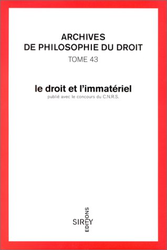
Référence complète : Archives de Philosophie du Droit (APD), Le droit et l'immatériel, tome 43, ed. Sirey, 1999, 521 p.
Lire la quatrième de couverture.
Lire les résumés des articles en langue anglais.
Lire la présentation de l'article de Hélène Ruiz Fabri, Immatériel, territorialité et État.
Voir la présentation d'autres tomes des Archives de Philosophie du Droit.
Compliance and Regulation Law bilingual Dictionnary

First of all, the Regulation and Compliance Law is difficult to understand in others languages than English, through translation, for example in French. This corpus of rules and institutions suffers from ambiguity and confusion because of its vocabulary of Anglophone origin, in which words or expressions that are similar or identical have not the same meaning in English and, for example, in French..
To every lord all honor, this is the case for the term "Regulation".
In English, "regulation" refers to the phenomenon which the French language expresses by the term "Régulation". But it can also aim at the complete fitting of what will hold a sector reaching a market failure and in which regulation is only one tool among others. The expression "regulatory system" will be used with precision, but also the term "Regulation", the use of the capital letter indicating the difference between the simple administrative power to take texts ("regulation") and the entire system which supports the sector ("Regulation"). It is inevitable that in a quick reading, or even by the play of digital, which overwrites the capital letters, and the automatic translations, this distinction of formulation, which stands for a lower / upper case, disappears. And confusion arises.
The consequences are considerable. It is notably because of this homonymy, that frequently in the French language one puts at the same level the Droit de la Régulation ("regulatory law, Regulation") and the réglementation (regulation). It will be based on such an association, of a tautological nature, to assert that "by nature" the Regulatory Law is "public law", since the author of the reglementation (regulation) is a person of public law, in particular the State or Independent administrative authorities such as Regulators. There remains the current and difficult justification for the considerable presence of contracts, arbitrators, etc. Except to criticize the very idea of Regulatory Law, because it would be the sign of a sort of victory of the private interests, since conceived by instruments of private law.
Thus two major disadvantages appear. First of all, it maintains in the Law of Regulation the summa divisio of Public and Private Law, which is no longer able to account for the evolution of Law in this field and leads observers, notably economists or international Institutions, to assert that the Common Law system would be more adapted today to the world economy notably because if it does indeed place administrative law, constitutional law, etc., it does not conceive them through the distinction Law Public / private law, as the Continental system of Civil Law continues to do.
Secondly, no doubt because this new Law draws on economic and financial theories that are mainly built in the United Kingdom and the United States, the habit is taken to no longer translate. In other languages, for example, texts written in French are phrases such as "le Régulateur doit être accountable".
It is inaccurate that the idea of accountability is reducible to the idea of "responsibility". The authors do not translate it, they do not recopy and insert it in texts written in French.
One passes from the "translation-treason" to the absence of translation, that is to say to the domination of the system of thought whose word is native, here the U.K. and the U.S.A.
One of the current major issues of this phenomenon is in the very term of "Compliance". The French term "conformité" does not translate it. To respect what compliance is, it is appropriate for the moment to recopy the word itself, so as not to denature the concept by a translation. The challenge is to find a francophone word that expresses this new idea, particularly with regard to legal systems that are not common law, so that their general framework remains.
Compliance and Regulation Law bilingual Dictionnary

Paradoxically, the notion of conflict of interest seems to be at the center of Economic Law only recently in Economic Law, in both Corporate and Public Law. This is due to the philosophy which animates these two branches of Law, very different for each, and which has changed in each.
In fact, and in the first place in Public Law, in the Continental legal systems and especially in French legal tradition, on the side of the State, the one who serves it, by a sort of natural effect,, makes the general interest incarnated by the State pass before its personal interest. There is an opposition of interests, namely the personal interest of this public official who would like to work less and earn more, and the common interest of the population, who would like to pay less taxes and for example benefit trains that always arrive on time and the general interest which would be for example the construction of a European rail network.
But this conflict would be resolved "naturally" because the public official, having "a sense of the general interest" and being animated by the "sense of public service", sacrifices himself to serve the general interes. He stays late at his office and gets the trains on time. This theory of public service was the inheritance of royalty, a system in which the King is at the service of the People, like the aristocracy is in the "service of the King." There could therefore be no conflict of interest, neither in the administration nor in the public enterprises, nor to observe, manage or dissolve. The question does not arise ...
Let us now take the side of the companies, seen by the Company Law. In the classical conception of corporate governance, corporate officers are necessarily shareholders of the company and the profits are mandatorily distributed among all partners: the partnership agreement is a "contract of common interest". Thus, the corporate officer works in the knowledge that the fruits of his efforts will come back to him through the profits he will receive as a partner. Whatever its egoism - and even the agent must be, this mechanism produces the satisfaction of all the other partners who mechanically will also receive the profits. Selfishness is indeed the motor of the system, as in the classical theory of Market and Competition. Thus, in the corporate mechanism, there is never a conflict of interest since the corporate officer is obligatorily associated: he will always work in the interest of the partners since in this he works for himself. As Company Law posits that the loss of the company will also be incurred and suffered by all partners, he will also avoid this prospect. Again, there is no need for any control. The question of a conflict of interest between the mandatary and those who conferred this function does not structurally arise...
These two representations both proved inaccurate. They were based on quite different philosophies - the public official being supposed to have exceeded his own interest, the corporate officer being supposed to serve the common interest or the social interest by concern for his own interest - but this was by a unique reasoning that these two representations were defeated.
Let us take the first on Public Law: the "sense of the State" is not so common in the administration and the public enterprises, that the people who work there sacrifice themselves for the social group. They are human beings like the others. Researchers in economics and finance, through this elementary reflection of suspicion, have shattered these political and legal representations. In particular, it has been observed that the institutional lifestyle of public enterprises, very close to the government and their leaders, is often not very justified, whereas it is paid by the taxpayer, that is, by the social group which they claimed to serve. Europe, by affirming in the Treaty of Rome the principle of "neutrality of the capital of enterprises", that is to say, indifference to the fact that the enterprise has as its shareholder a private person or a public person, validated this absence of exceeding of his particular interest by the servant of the State, become simple economic agent. This made it possible to reach the conclusion made for Company Law.
Disillusionment was of the same magnitude. It has been observed that the corporate officer, ordinary human being, is not devoted to the company and does not have the only benefit of the profits he will later receive as a partner. He sometimes gets very little, so he can receive very many advantages (financial, pecuniary or in kind, direct or indirect). The other shareholders see their profits decrease accordingly. They are thus in a conflict of interest. Moreover, the corporate officer was elected by the shareholders' meeting, that is to say, in practice, the majority shareholder or the "controlling" shareholder (controlling shareholder) and not by all. He may not even be associated (but a "senior officer").
The very fact that the situation is no longer qualified by lawyers, through the qualifications of classical Company Law, still borrowing from the Civil Contract Law, the qualifications coming more from financial theories, borrowing from the theory of the agency, adically changed the perspective. The assumptions have been reversed: by the same "nature effect", the conflict of interest has been disclosed as structurally existing between the manager and the minority shareholder. Since the minority shareholder does not have the de facto power to dismiss the corporate officer since he does not have the majority of the voting rights, the question does not even arise whether the manager has or has not a corporate status: the minority shareholder has only the power to sell his securities, if the management of the manager is unfavorable (right of exit) or the power to say, protest and make known. This presupposes that he is informed, which will put at the center of a new Company Law information, even transparency.
Thus, this conflict of interests finds a solution in the actual transfer of securities, beyond the legal principle of negotiability. For this reason, if the company is listed, the conflict of interest is translated dialectically into a relationship between the corporate officer and the financial market which, by its liquidity, allows the agent to be sanctioned, and also provides information, Financial market and the minority shareholder becoming identical. The manager could certainly have a "sense of social interest", a sort of equivalent of the state's sense for a civil servant, if he had an ethics, which would feed a self-regulation. Few people believe in the reality of this hypothesis. By pragmatism, it is more readily accepted that the manager will prefer his interest to that of the minority shareholder. Indeed, he can serve his personal interest rather than the interest for which a power has been given to him through the informational rent he has, and the asymmetry of information he enjoys. All the regulation will intervene to reduce this asymmetry of information and to equip the minority shareholder thanks to the regulator who defends the interests of the market against the corporate officers, if necessary through the criminal law. But the belief in managerial volunteerism has recently taken on a new dimension with corporate social responsability, the social responsibility of the company where managers express their concern for others.
The identification of conflicts of interests, their prevention and their management are transforming Financial Regulatory Law and then the Common Law of Regulation, because today it is no longer believed a priori that people exceed their personal interest to serve the interest of others. It is perhaps to regain trust and even sympathy that companies have invested in social responsibility. The latter is elaborated by rules which are at first very flexible but which can also express a concern for the general interest. In this, it can meet Compliance Law and express on behalf of the companies a concern for the general interest, if the companies provide proof of this concern.
To take an example of a conflict of interest that resulted in substantial legal changes, the potentially dangerous situation of credit rating agencies has been pointed out when they are both paid by banks, advising them and designing products, While being the source of the ratings, the main indices from which the investments are made. Banks being the first financial intermediaries, these conflicts of interest are therefore systematically dangerous. That is why in Europe ESMA exercises control over these rating agencies.
The identification of conflicts of interest, which most often involves changing the way we look at a situation - which seemed normal until the point of view changes - the moral and legal perspective being different, Trust one has in this person or another one modifying this look, is today what moves the most in Regulation Law.
This is true of Public and Corporate Law, which are extended by the Regulation Law, here itself transformed by Compliance Law, notably by the launchers of alerts. But this is also true that all political institutions and elected officials.
For a rule emerges: the more central the notion of conflict of interest becomes, the more it must be realized that Trust is no longer given a priori, either to a person, to a function, to a mechanism, to a system. Trust is no longer given only a posteriori in procedures that burden the action, where one must give to see continuously that one has deserved this trust.
Compliance and Regulation Law bilingual Dictionnary

Legally, the State is a public law subject defined by territory, people and institutions. It acts in the international space and emits norms. Politically, it has the legitimacy required to express the will of the social body and to exercise the violence of which it deprives the other subjects of law. It is often recognizable by its power: its use of public force, its budgetary power, its jurisdictional power. These three powers, declining or being challenged by private, international and more satisfying mechanisms, some predicted the disappearance of the State, to deplore it or to dance on its corpse.
With such a background, in current theories of Regulation, primarily constructed by economic thought and at first sight one might say that the State is above all the enemy. And this for two main reasons. The first is theoretical and of a negative nature. The advocates of the theory of regulation deny the State the political qualities set out above. The State would not be a "person" but rather a group of individuals, civil servants, elected officials and other concrete human beings, expressing nothing but their particular interests, coming into conflict with other interests, and using their powers to serve the former rather than the latter as everyone else. The Regulation theory, adjoining the theory of the agency, is then aimed at controlling public agents and elected representatives in whom there is no reason to trust a priori.
The second reason is practical and positive. The State would not be a "person" but an organization. Here we find the same perspective as for the concept of enterprise, which classical lawyers conceive as a person or a group of people, while economists who conceive of the world through the market represent it as an organization. The state as an organization should be "efficient" or even "optimal". It is then the pragmatic function of the Regulation Law. When it is governed by traditional law, entangled by that it would be an almost religious illusions of the general interest, or even the social contract, it is suboptimal. The Regulation purpose is about making it more effective.
To this end, as an organization, the State is divided into independent regulatory agencies or independent administrative authorities that manage the subjects as close as possible, which is fortunate in reducing the asymmetry of information and in reviving trust in a direct link. The unitary, distant and arrogant State is abandoned for a flexible and pragmatic conception of a strategic state (without capital ...) that would finally have understood that it is an organization like any other ...
Competition law adopts this conception of the State, which it posed from the beginning that it was an economic operator like any other. This is how this conception which would be more "neutral" of the world is often presented.
Successive crises, whether sanitary or financial, have produced a pendulum effect.
Now, the notions of general interest or common goods are credited of an autonomous value, and the necessity of surpassing immediate interests and of finding persons to bear superior interests or to take charge of the interests of others, even a non-immediate one, emerged.
Thus, the State or the public authority, reappears in the globalization. The Compliance Law or the Corporal Social Responsibility of the crucial companies are converging towards a consideration of the State, which can not be reduced to a pure and simple organization receptacle of externalities.
Thesaurus : Doctrine
Thesaurus : Doctrine
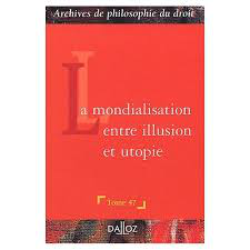
Référence complète : Salah, M., La mondialisation vue de l'Islam, in Archives de Philosophie du Droit, La mondialisation entre illusion et utopie, tome 47, Dalloz, 2003, 27-54.
La mondialisation apparaît comme une occidentalisation des cultures et du droit. L'Islam qui prend forme juridique devrait se l'approprier sans se dénaturer. La réussite d'un tel processus difficile dépendra de la qualité de la régulation qui sera mise en place.
Lire une présentation générale de l'ouvrage dans lequel l'article a été publié.
Les étudiants de Sciences po peuvent via le drive lire l'article dans le dossier "MAFR - Régulation".
Thesaurus : Doctrine
Teachings : Grandes Questions du Droit, Semestre d'Automne 2014

Compliance and Regulation Law bilingual Dictionnary

The distinction between "Public Law" and "Private Law" is important. In the systems of Continental Law, or still called under Roman-Germanic Law, or even called Civil Law systems, it is even around it that legal systems are built: it can be a basic distinction, a summa divisio, as it it in the Civil Law systems. In the so-called Common Law or Anglo-American systems, the distinction is less fundamental, but it remains, justifying in particular that the rules and disputes concerning the administration call for special rules and are apprehended by special tribunals.
In principle, this distinction is based on the nature of the persons whose legal situation is examined. Under"Public Law" a legal situation involving a person who is itself a public-law entity: the State, a local authority, a public undertaking, etc. That is why, for example, the contract which may be concluded will be of public law, and the judge who may be seized of it will be an administrative court. If the situation does not involve a person governed by public law, then it will be governed by "Private Law". There are a thousand exceptions, but this is the starting and basic and fondamental principle.
Two essential remarks, bearing a system of values, explaining that the systems of Civil Law and Common Law are in fact confronting each other.
The two bodies of rules and institutions are not of equal strength because one of the categories is "closed", corresponding to one criterion (the "public person"), while the other is open: Public Law is a closed category; on the contrary, Private law becomes "active" as soon as there is no public person (a "private person" who or which must define himself or itself as a "non-public person").
One can consider this articulation between Public Law and Private Law in two ways, radically opposed. It may express a mark of inferiority in disfavour of private law: we are all "ordinary" persons in "ordinary" situations with "ordinary" activities (this will be the French conception ....). On the contrary, Public Law is the mark of the State, of Public Order, of Sovereignty, of public power, of the general will, in the interstices of which individuals slip in to act and satisfy their small particular interests
On the contrary, Private Law can be considered as the expression of the "common law": people are free and do what they want, through ownership and contract. As an exception and because they have elected people to do so, the rulers (whom they control), by exception, enact norms that constrain them. But this is an exception, since repression - public law and criminal law, which has the same status in this respect - is only a tribute to the freedom of persons, since this freedom remains wholly in the form of the private enterprise on the market.
It is then measured that the articulation between Public and Private Law profoundly reflects a philosophy and a political position. If it is considered that Regulation is the underlying order by which the Sovereign allows the deployment of his subjects who also benefit from a long-term policy constructed by the autonomous and measured political will, then Public Law in Is the master, the Regulation Law expressing a renewed search for efficiency, this but only this. If we believe that Regulation is whereby economic rationality manages to protect persons and companies from risks and to compensate for market failures, a market whose liberal principle remains the ideal, then Private Law is the core, whith contract and private property as basis tools.
France and the Latin countries adhere rather to this metaphysics of values which entrusts to the Public Authorities and the State the legitimacy and the power to express the general interest by Public Law, Regulators and Constitutional Courts, expressing it on a technical form renewed by the Regulatory tools: incitations, soft law, etc. The legal systems whose history draws on British history put more trust in the person of the entrepreneur and conceive of Regulation Law as an efficient outsourcing of functions to administrations that are efficient, informed and impartial.
Certainly, in the technical daily of the Law of Regulation and following the different sectors, Public and Private Law mix up: public companies take the form of publicly traded companies under private law or private companies will be entrusted with missions of public service, instituting them as second-level regulators as are the infrastructure network operators.
But the fundamental conception of systems (rooted in the history of the people) and practice marry. In the silence of regulations (and the more they are gossiping and the more the judge must interpret them, which amounts to a "silence"), what sense to give to the system?
To take only a few questions, frequent in practice:
- What judge to seize? The administrative judge or the civil judge? What is the "natural judge" of the Regulatory Law?
- What standard to apply? The contractual will? The implicit will of the legislator? What is the "natural author" of the Law of Regulation?
- Does the silence of the text prohibit action for operators or on the contrary does silence mean their freedom to act?
The absence of a firm and shared definition of what is the Law of Regulation does not facilitate practice. Hesitations in translations from one language to another increase confusion.
For the time being, there is a tendency to refer to Public Law in the sectors where whe take precedence over public operators' monopolies, such as telecommunications, energy, railways, air and postal services, and to refer to Private Law in the sectors which have long been the subject of competition between operators, namely banking, finance and insurance.
It should be recognized that the criterion of distinction has little economic rationale. The notion of risk would be a clearer and more manageable criterion. But it would then lead to a greater challenge to the distinction between Public and Private Law. Because the Law of Regulation, impregnated with Economy and Economic Analysis of Law, has sometimes little basis of legal tradition, it put in question of this summa divisio. If this were to be the case, it would be the totality of the legal systems which would be upset, especially in its judicial organization, since the judicial civil and commercial system is so distinctly distinguished (that of "ordinary" persons, that of "common law ) and the administrative judge (the "natural judge" of the State). It is then realized that the Law of Regulation challenges the whole Law, especially in the Latin countries and the Civil Law systems.
Feb. 2, 2026
Thesaurus : Doctrine
► Référence complète : M. Fabre-Magnan, Consentir à quoi ? Consentement et relations sexuelles, Gallimard, coll." Tracts", n°74, 2026, 50 p.
____
voir le post écrit à son propos
____
Oct. 5, 2025
Newsletter MAFR - Law, Compliance, Regulation

🌐follow Marie-Anne Frison-Roche on LinkedIn
🌐subscribe to the Newsletter MAFR Regulation, Compliance, Law
🌐subscribe to the Video Newsletter MAFR Surplomb
🌐subscribe to the Newsletter MaFR Droit & Art
____
► Full Reference: M.-A. Frison-Roche, ""Juge modeste" ou "check and balance" :alternative aux Etats-Unis, alternative en France" ("modest judge" or "check and balance": alternative in the United States, alternative in France), Newsletter MAFR Law, Compliance, Regulation, 6 October 2025..
____
📧Read by free subscription other news from the MAFR Newsletter - Law, Compliance, Regulation
____
► Summary of this article: Recent, if not forthcoming, decisions by the US Supreme Court show that the American political system that was based on the unwritten principle of Check and Balance, requiring the Justices to constitute one Power facing the other two could be replaced by a political system based on the principle of a "modest Justice" enforcing decisions made by the Federal Executive. They would then have a new Constitution.
In Western Europe and especially in France, it is possible that the letter of the Constitution, which states that judges are not an autonomous power vis-à-vis the other two powers, will be abandoned and that, in the name of an unwritten principle, the Rule of Law, its transformation into an autonomous Power facing the executive in its own right will be adopted. The path would be exactly the opposite. We would then have changed the Constitution.
That's conceivable, and there are many arguments in favour of it.
We have to say so. And draw all the consequences.
____
📧read below the article published the 6 October dans the Newsletter MAFR - Law, Compliance, Regulation ⤵️
Sept. 6, 2025
Editorial responsibilities : Direction of the collection "Cours-Série Droit privé", Editions Dalloz (33)
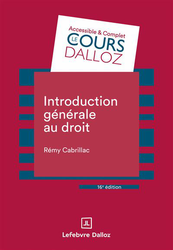
► Référence complète : R. Cabrillac, Introduction générale au droit, 1ière éd. 1995 - 16ième éd., 2025, Dalloz, Coll. "Cours Dalloz-Série Droit privé", 294 p.
____
Le droit est réputé complexe, voire rébarbatif. Pour dépasser cette impression, qui ne correspond pas à sa nature, cet ouvrage, résolument pédagogique, s’adressent aux étudiants qui prennent contact pour la première fois avec la matière.
Il décrit tout d’abord les fondements du droit, ses origines et ses classifications puis il expose les sources du droit, les preuves et le procès.
► Structure du Cours :
- Les fondements du droit contemporain
- Les sources du droit
- La preuve des droits
- Les juridictions civiles
- Le déroulement d'un procès
- La réalisation contentieuses
Il est complété par des tests de connaissances.
____
Aug. 27, 2025
Editorial responsibilities : Direction of the collection "Cours-Série Droit privé", Editions Dalloz (33)

► Référence complète : A. Marais, Droit des personnes, Dalloz, Coll. "Cours Dalloz-Série Droit privé", 5ième éd. 2021, 349 p.
____
► présentation de ce Cours : Depuis la première édition de son ouvrage, la professeure Astrid Marais débute la présentation de celui-ci ainsi : "Tout est chose ou personne".
À partir de ce principe essentiel, le manuel décrit comment le droit détermine les deux catégories de personnes : les personnes physiques et les personnes morales, comme il les individualise et comment il les protège. Le souci des personnes physiques est d'autant plus grand aujourd'hui que le droit prend en considération le corps des êtres humains.
C'est notamment pourquoi l'ouvrage expose le "Droit des personnes" à travers les diverses branches du Droit, désormais toutes concernées par celles-ci.
____
📚Consulter l'ensemble de la collection dans laquelle l'ouvrage a été publié.
____
📕📕📕Consulter la présentation des Cours corréls à celui-ci :
🕴️D. Fenouillet, 📕Droit de la famille
🕴️Ch. André, 📕Droit pénal spécial
🕴️A.-M. Leroyer, 📕Droit des successions
________
Aug. 20, 2025
Editorial responsibilities : Direction of the collection "Cours-Série Droit privé", Editions Dalloz (33)
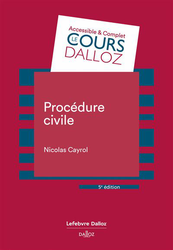
►Référence complète : N. Cayrol, Procédure civile, 5ème éd., Coll. "Cours Dalloz-Série Droit privé", Dalloz, 2025, 569 p.
____
►Présentation de l'ouvrage : L'étude de la procédure civile est indispensable à tous les étudiants désireux d'embrasser une « carrière judiciaire » : magistrat, avocat, huissier, etc. Par nombre d'aspects, la procédure civile est bien, en effet, un droit professionnel, un droit à l'usage des professionnels du procès. La matière figure d'ailleurs aux épreuves des concours et examens d'accès à ces professions.
Mais la procédure civile n'est pas seulement un droit professionnel : elle traite de problèmes qui intéressent tous les juristes, quels qu'ils soient, qu'ils pratiquent ou non la procédure. La connaissance des notions procédurales de base est nécessaire pour la bonne compréhension de nombreuses questions de droit.
___
📚Voir l'ensemble des ouvrages de la même collection "Cours Dalloz -Série Droit privé", créée et dirigée par Marie-Anne Frison-Roche,
et notamment ceux qui traitent des branches du Droit interférant avec la Procédure civile :
📕 Procédures civiles d'exécution
📕 Institutions juridictionnelles
_______
May 12, 2025
Thesaurus : Doctrine

► Référence complète : L. Murphy, "Legal Practice et the Responsibility of Individuals", conférence au Collège de France,12 mai 2025.
____
____
► Présentation de la conférence (faite par le Collège de France) : Some legal practices, such as the private law of obligations and property, are justified by the good that general compliance with their rules bring about. It cannot be said, however, that each particular act of compliance by individuals itself contributes to that good outcome. And yet there is clearly an ethical tie between individuals and the rules of the practices. Leaving aside cases where the law simply protects independent moral rights, the same points can be made about compliance with law generally.
This lecture explores the question of how we should understand the ethical tie between individuals and legal practices that are justified in terms of the social good produced by general compliance. An imperfect duty of impartial beneficence will play a central role in the account.
________
March 14, 2025
Thesaurus : Doctrine
► Référence complète : L. d'Avout, "Entre Luxembourg et Strasbourg, la fabrication médiatique du droit civil européen", Conférence à l'Université Toulouse-Capitole, 14 mars 2025.
► Présentation de la conférence par l'Université : cliquer ICI
____
🎥 Voir et Ecouter la conférence.
_________
Dec. 5, 2024
Thesaurus : Soft Law
► Référence complète : Réponse du Ministère de l'économie, des finances et de l'industrie sur l'ouverture aux géomètres-topographes des prestations de bornage, 5 décembre 2024 : JO Sénat 5 déc. 2024, p. 4682
____
📜lire la réponse ministérielle
________
Sept. 26, 2024
Editorial responsibilities : Direction of the collection "Cours-Série Droit privé", Editions Dalloz (33)
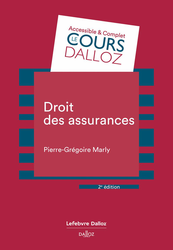
► Référence complète : P.-Gr. Marly, Droit des assurances, Dalloz, coll. "Cours Dalloz-Série Droit privé", 1ière éd., 2013, 2ième éd., 2024, 330 p.
____
► Présentation de l'ouvrage : Le droit des assurances : la rencontre d'un acte conjuratoire et d'un art prédictif.
L'assurance entreprend de saisir l'avenir en organisant la rencontre d'un acte conjuratoire et d'un art prédictif. Or, cette rencontre émerge juridiquement d'un contrat dont le régime est décliné au Livre premier du Code des assurances.
L'objet du présent ouvrage est de parcourir ce Livre afin d'y découvrir ou approfondir un corpus normatif dont la technicité n'a d'égal que la richesse.
Sous l'éclairage de la jurisprudence et de la doctrine, le droit des assurances convie à une réflexion sans cesse renouvelée que le présent cours ambitionne de présenter autant que de nourrir. Structuré en un plan tripartite, il propose d'examiner les règles communes à tout contrat d'assurance avant d'étudier les dispositions propres aux assurances de dommages puis aux assurances de personnes.
Cet ouvrage pédagogique intéressera les étudiants en M1 et M2 spécialisé ainsi que les professionnels de l'assurance.
____
📚Consulter l'ensemble de la collection dans laquelle l'ouvrage est publié
________
Sept. 19, 2024
Editorial responsibilities : Direction of the collection "Cours-Série Droit privé", Editions Dalloz (33)
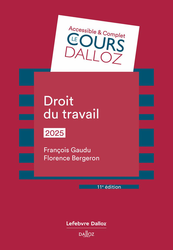
► Référence complète : F. Gaudu & F. Bergeron-Canut, Droit du travail 2025, Dalloz, coll. "Cours Dalloz-Série Droit privé", 11ième éd., 2024, 720 p.
____
► Présentation de l'ouvrage : Ce manuel à jour des derniers textes s'adresse à tous les étudiants en droit et à tous les praticiens qui actualisent leurs connaissances.
Il développe dans une première partie les " relations individuelles de travail " (formation du rapport contractuel, exécution et rupture du contrat de travail), pour consacrer sa seconde partie aux " relations collectives de travail ", (conflits collectifs du travail, représentation et la négociation collective et convention collective de travail).
____
📚Consulter l'ensemble de la collection dans laquelle l'ouvrage est publié
____
📚Sont directement corrélés à cet ouvrage :
🕴️F. Kessler, 📕Droit de la protection sociale
🕴️V. Magnier, 📕Droit des sociétés
________
Sept. 12, 2024
Conferences

🌐follow Marie-Anne Frison-Roche on LinkedIn
🌐subscribe to the Newsletter MAFR Regulation, Compliance, Law
____
► Full Reference: M.-A. Frison-Roche, participation to the round table "Le droit à l'enfant : réalité ou faux concept ?" ("The right to a child: reality or false concept?"), in Regards croisés sur les nouvelles filiations, Cour d'appel de Paris (Paris Court of Appeal), September 12, 2024
____
🧮see the full programme of this event
____
► Summary of the conference:
________